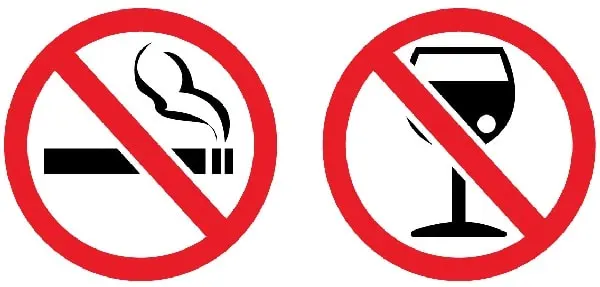Bariatric surgery offers a profound intervention for severe obesity, yielding significant weight loss and comorbidity resolution. However, the patient journey extends beyond the surgical procedure itself. A critical, yet often underemphasized, aspect involves the nuanced changes in substance use post-surgery. Research consistently demonstrates altered alcohol metabolism and increased alcohol use disorder risk in this population. Similarly, smoking patterns may shift following weight loss surgery, presenting distinct challenges for patient management. Understanding these specific post-operative behavioral adaptations is crucial for optimizing long-term health outcomes and developing targeted support strategies. Comprehensive pre- and post-operative screening, alongside tailored interventions, can effectively mitigate these potential risks.
Table of Contents
How Do Alcohol and Smoking Affect You After Weight Loss Surgery?
Alcohol and cigarette consumption before and after weight loss surgery undergoes significant changes due to anatomical modifications and altered absorption patterns. Gastric bypass and other bariatric procedures fundamentally transform how your body processes substances, creating heightened sensitivities and increased health risks that require careful consideration.
Key Changes and Risks Associated with Post-Surgical Substance Use:
- Blood alcohol levels rise 2-3 times higher after gastric bypass surgery compared to pre-operative levels
- Nicotine absorption increases substantially due to reduced stomach capacity and altered gastric emptying
- Wound healing complications occur more frequently in patients who continue tobacco use post-operatively
- Alcohol sensitivity peaks within the first 6-12 months following bariatric surgery
- Cigarette smoking increases the risk of anastomotic leaks by up to 40% in gastric bypass patients
- Dehydration risks amplify significantly when combining alcohol consumption with reduced fluid intake capacity
- Nutritional deficiencies worsen when alcohol interferes with vitamin and mineral absorption
- Dumping syndrome symptoms intensify with alcohol consumption in patients who have undergone gastric bypass procedures
The anatomical changes following weight loss surgery create a direct pathway for alcohol to enter the small intestine rapidly. This bypass of normal gastric processing results in accelerated absorption and prolonged intoxication periods. Smoking and alcohol use gastric bypass patients experience compounds these effects, as nicotine further alters gastric motility and digestive function.
Post-operative patients face increased vulnerability to substance-related complications due to reduced gastric volume and modified digestive anatomy. The altered gastroesophageal junction in sleeve gastrectomy patients creates additional risks for gastroesophageal reflux when combined with smoking. Alcohol metabolism changes persist indefinitely after bariatric surgery, requiring permanent lifestyle modifications.
The following table illustrates the significant differences in tolerance, risks, and surgical outcomes before and after weight loss surgery:
| Factor | Pre-Surgery | Post-Surgery |
|---|---|---|
| Alcohol Absorption Time | 30-60 minutes | 10-15 minutes |
| Peak Blood Alcohol Level | Standard response | 2-3x higher |
| Intoxication Duration | 2-4 hours | 4-8 hours |
| Healing Complications (Smoking) | Moderate risk | High risk (40% increase) |
| Nutritional Impact | Limited effect | Severe deficiency risk |
| Dehydration Risk | Low-moderate | Critically high |
Alcohol and cigarette consumption after bariatric surgery presents unique challenges that extend beyond typical health concerns. The modified digestive system cannot process alcohol efficiently, leading to unpredictable intoxication patterns and prolonged recovery times. Patients often report unexpected reactions to amounts they previously tolerated without difficulty.
Smoking cessation becomes particularly crucial following bariatric procedures due to compromised healing capacity and increased infection risks. The reduced oxygen-carrying capacity associated with smoking directly conflicts with the body’s heightened need for optimal healing resources. Gastric bypass patients who continue smoking face significantly higher rates of complications including ulceration and anastomotic breakdown.
The interaction between alcohol and prescribed medications intensifies after weight loss surgery. Rapid absorption rates increase the risk of dangerous drug interactions, while altered liver function affects medication metabolism. Post-operative patients require careful monitoring when taking any medications alongside alcohol consumption.
Long-term effects of continued substance use after bariatric surgery include accelerated bone density loss and increased cardiovascular risks. The combination of nutritional malabsorption and substance interference creates a cascade of health complications that can compromise surgical success. Patients who maintain alcohol and tobacco use demonstrate lower weight loss maintenance rates and higher complication frequencies compared to those who abstain completely.
Weight loss surgery patients must recognise that their relationship with alcohol and tobacco requires permanent modification. The physiological changes are irreversible, meaning heightened sensitivity and increased risks persist throughout their lifetime. Understanding these fundamental alterations enables informed decision-making and promotes optimal post-operative outcomes. This understanding can also inform lifestyle choices, particularly regarding Gastric Sleeve Recovery Milestones, as it highlights the importance of regulating alcohol and cigarette consumption before and after weight loss surgery. By making healthier choices, individuals can support their recovery and enhance long-term health benefits.
Psychological Factors Behind Substance Use Changes After Bariatric Surgery
- Addiction transfer syndrome represents a significant psychological phenomenon where patients redirect compulsive behaviours from food to other substances following bariatric procedures. Research indicates that approximately 15-20% of bariatric patients experience this neurobiological shift, as the brain’s reward pathways seek alternative sources of dopamine stimulation when food intake becomes restricted.
- Maladaptive stress management emerges when patients lose their primary coping mechanism of emotional eating. The physiological stress response remains unchanged post-surgery, yet the familiar comfort derived from food consumption is no longer achievable due to anatomical restrictions and altered gastric capacity.
- Altered neurotransmitter regulation significantly influences behavioural changes following weight loss surgery. The dramatic reduction in food volume and caloric intake disrupts serotonin and dopamine production, creating neurochemical imbalances that drive compensatory seeking behaviours toward alternative mood-altering substances.
- Loss of emotional regulation strategies occurs when food-based comfort mechanisms become unavailable. Patients who previously managed anxiety, depression, or trauma through overeating find themselves psychologically vulnerable, often gravitating toward substances that provide similar emotional numbing or mood enhancement effects.
- Social identity reconstruction challenges frequently trigger substance experimentation as patients navigate their transformed physical appearance and social dynamics. The psychological adjustment to a new body image and altered social interactions can create identity confusion, leading some individuals to adopt new behavioural patterns including substance use.
- Metabolic sensitivity changes create unexpected psychological responses to substances that were previously tolerated differently. Post-surgical patients experience heightened substance effects due to altered absorption rates and reduced gastric capacity, which can reinforce addictive patterns through intensified reward experiences.
- Impulse control dysregulation manifests when the prefrontal cortex adaptations that once managed food impulses become redirected toward other compulsive behaviours. The neural pathways associated with impulse management remain hyperactive, seeking new targets for compulsive engagement when food restrictions eliminate the original outlet.
- Reward deficiency compensation drives patients to seek alternative sources of pleasure and satisfaction. The dramatic reduction in food-derived pleasure creates a neurobiological deficit that the brain attempts to fill through experimentation with substances that activate similar reward centres.
- Psychological grief responses emerge as patients mourn the loss of their relationship with food. This mourning process often includes stages of denial, anger, and bargaining, during which some individuals may turn to substances as a means of managing the emotional complexity of their transformed eating behaviours.
- Chronic stress adaptation failures occur when patients struggle to develop healthy stress management techniques post-surgery. The elimination of stress-eating patterns leaves a significant coping void, particularly during the initial 12-18 months following surgery when psychological adaptation is most challenging.
- Cognitive distortion patterns influence substance-related decision-making through rationalization and minimization behaviours. Patients may justify substance use as a healthier alternative to overeating, failing to recognize the potential for developing new addictive patterns with equally serious health consequences.
- Neuroplasticity disruption affects the brain’s ability to form new, healthy coping mechanisms while simultaneously managing the loss of established food-related neural pathways. This neurobiological transition period creates psychological vulnerability that predisposes patients to seeking familiar comfort through alternative substances.
Support Programs for Quitting Alcohol and Tobacco After Weight Loss Surgery
Specialised cessation programs address the unique requirements of post-bariatric patients through evidence-based interventions and multidisciplinary care approaches. These programmes recognise the distinct physiological and psychological challenges faced during the recovery period.
Key support resources encompass multiple therapeutic modalities designed specifically for bariatric populations:
- Cognitive Behavioural Therapy (CBT) adapted for post-surgical patients addresses maladaptive coping mechanisms and develops healthy behavioural patterns
- Nicotine Replacement Therapy (NRT) protocols modified for altered absorption rates following gastric procedures
- Pharmacological interventions including varenicline and bupropion, with dosage adjustments based on post-surgical physiology
- Group therapy sessions facilitated by addiction specialists with bariatric surgery experience
- Mindfulness-based relapse prevention (MBRP) programmes targeting stress management and emotional regulation
- Peer support networks connecting patients with similar surgical histories and recovery journeys
- Family counselling services addressing relationship dynamics and home environment modifications
- Digital health platforms providing continuous monitoring and intervention delivery
Research demonstrates that structured cessation programmes increase long-term abstinence rates by approximately 40% compared to standard treatments. These programmes incorporate specialised protocols addressing altered drug metabolism and heightened addiction transfer risks.
Healthcare teams implement comprehensive support programmes through systematic approaches that ensure continuity of care and optimal patient outcomes. The implementation process follows evidence-based protocols established through clinical research and best practice guidelines.
Programme implementation occurs through carefully coordinated phases:
- Pre-surgical assessment identifies current substance use patterns and establishes baseline measurements for tobacco and alcohol consumption
- Risk stratification categorises patients based on addiction severity scores and previous cessation attempt histories
- Individualised treatment planning incorporates patient preferences, medical contraindications, and psychosocial factors into customised intervention strategies
- Multi-modal therapy initiation combines pharmacological and behavioural interventions within the first post-operative month
- Regular monitoring protocols track progress through biochemical validation and standardised questionnaire assessments every two weeks initially
- Adjustment periods allow for treatment modifications based on patient response and emerging challenges during the first three months
- Long-term maintenance planning establishes ongoing support structures and relapse prevention strategies extending beyond the first year
- Outcome evaluation measures success rates through validated assessment tools and long-term follow-up appointments
Successful programmes demonstrate superior efficacy when integrated within existing bariatric care pathways. Clinical teams report that patients receiving structured cessation support achieve abstinence rates exceeding 65% at twelve-month follow-up assessments.
The integration of addiction medicine specialists within bariatric surgery teams has transformed post-operative care standards across UK healthcare facilities. These collaborative approaches ensure that substance cessation becomes a cornerstone of surgical success rather than an afterthought. Current evidence supports the implementation of mandatory cessation programmes as standard practice, with funding allocation increasingly directed toward comprehensive addiction support services within bariatric surgery centres throughout 2025.




